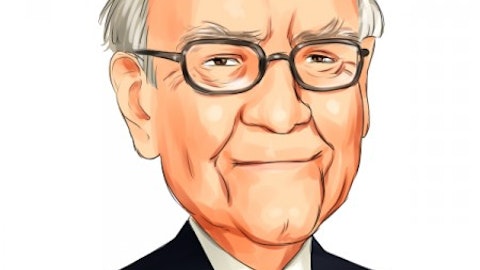Numerous financial news websites and stock market participants call activist investors “vultures”, who aim to extract short-term benefits at the expense of companies’ long-term performance. But I don’t think for an instant that reputable activist Carl Icahn and some of his peers share a short-term vision. On the contrary, numerous activists, including Icahn, have pushed for changes or proposed new strategies aimed at increasing efficiency and creating long-term value, and hold onto their investments for years. Of course, there are some players in the hedge fund industry who focus on a short-term horizon and seek short-term value extraction, but the shareholder activism arena has changed quite dramatically over the years. Leaving the controversy about the benefits and detriments of shareholder activism aside, let’s take a look at three 13D (activist) filings recently submitted by activists Jeffrey Smith, Paul Singer, and Brad Gerstner.
Imitating hedge funds and other institutional investors can help identify some of the most profitable stocks on the market. However, our extensive research that covered the period between 1999 and 2012, showed that the best approach is to follow these investors into their small-cap stocks. Our backtests showed that the 15 most popular small-cap stocks among hedge funds managed to generate a monthly alpha of 81 basis points, versus an alpha of 0.7 percentage points posted by their top 50 large-cap picks (see more details here).
According to a newly-amended 13D filing, Jeffrey Smith’s Starboard Value LP currently owns 42.28 million shares of Quantum Corp (NYSE:QTM), which constitute 14.8% of the company’s outstanding common stock. The filing discloses that the activist hedge fund has sold exactly 5.0 million shares over the past 60 days or so. It should be mentioned that Jeffrey C. Smith had served as a member of the company’s Board of Directors from 2013 through May 2015, when he announced his resignation. Upon Mr. Smith’s resignation, Quantum Corp (NYSE:QTM)’s CEO claimed that the activist investor “has been an integral part of our recent accomplishments and has helped to put the company on a path to long-term profitable growth and value creation”, though this statement is not entirely reflected in the company’s stock performance.
The expert in scale-out storage, archive and data protection has seen its shares decline by more than 50% since Jeffrey Smith joined the Board in May 2013. Moreover, the stock has lost 60% over the last year alone and trades at a forward price-to-earnings multiple of 9.56, which is substantially below the average of 15.38 for the S&P 500 family. Quantum’s total revenue for the first six months of fiscal year 2015 that ended September 30 totaled $227.88 million, down by 13.4% year-over-year. The decrease can be explained by the changing storage environment, which is defined by increasing demand for scale-out storage solutions and softening demand for data protection tape products. For that reason, the company’s goal for fiscal year 2016 includes driving up scale-out storage revenue and focusing on enhancing profitability. The smart money sentiment towards the stock was negative in the third quarter, as the number of hedge funds in our system with positions in the company declined to 17 from 24 quarter-over-quarter. Peter S. Park’s Park West Asset Management owns 9.32 million shares of Quantum Corp (NYSE:QTM) as of September 30.
Follow Jeff Smith's Starboard Value LP
Let’s move on to the next page of this article, where we discuss the other two 13D filings submitted with the SEC.
As revealed by a 13D filing, Paul Singer’s Elliott Associates L.P. and its affiliates have combined economic exposure to American Capital Ltd. (NASDAQ:ACAS) of roughly 11.9%. This includes 12.48 million shares of common stock, which account for 4.7% of the company’s outstanding common stock, and additional economic exposure to 7.2% of shares in the form of cash settled swaps with respect to 18.80 million shares. Paul Singer’s investment vehicles had economic exposure to the global asset manager and private equity firm of approximately 10.3% in mid-December 2015, as disclosed by the fund’s most recent 13D filing on the company.
American Capital mainly manages investments in middle market private equity, leveraged finance, real estate, energy and structured products. American Capital Ltd. (NASDAQ:ACAS) had intentions to spinoff one Business Development Company (BDC) last year, but activist Singer was a fierce opponent of the proposed spinoff plans. As a result, the company’s Board conducted a strategic review process and authorized the company to “proceed with soliciting offers to buy the company or its various business lines wholly or partially”. The company’s CEO and Chairman claimed that “our business lines and assets have tremendous value, which is not reflected in our current share price”, so the sale of the company will most likely unlock shareholder value. A total of 36 hedge funds tracked by Insider Monkey had stakes in the company at the end of the third quarter, amassing 33.10% of its shares. Andy Redleaf’s Whitebox Advisors reported owning 7.26 million shares of American Capital Ltd. (NASDAQ:ACAS) through its 13F filing for the September quarter.
Follow Paul Singer's Elliott Management
In a Schedule 13D filing, Brad Gerstner’s Altimeter Capital Management LP reported owning 11.50 million shares of United Continental Holdings Inc. (NYSE:UAL), which account for 3.1% of the company’s outstanding common stock. This compares to 9.3 million shares owned at the end of September. The investment firm believed that the company’s shares represented an attractive investment opportunity at the time of purchase. Moreover, Altimeter Capital had discussions with the company’s management, Board of Directors, and Paul Reeder and Edward Shapiro‘s PAR Capital Management, which is another large shareholder of the company, regarding strategies and options to create shareholder value. As a result, Altimeter Capital and PAR Capital might be considered an activist group, one which owns 20.46 million shares of the airline company, which represent 5.5% of its outstanding shares.
The second-largest U.S airline by capacity has seen its shares decline by 35% over the past year, presumably because of declining passenger revenue. The company’s consolidated passenger revenue declined by 2.4% in the first three quarters of 2015 relative to the same period of the prior year, mainly due to a toughening domestic fare environment, strengthening U.S dollar, and reduced travel from corporate customers in the energy sector. Nonetheless, the company’s net income for the first nine months of 2015 totaled $6.5 billion, up from $1.1 billion reported for the same period of 2014. Even more to that, the stock trades at a forward P/E multiple of 5.42, which is notably below the ratio for the S&P 500 Index. It remains to be seen whether the aforementioned activist duo will be successful in creating shareholder value. A total of 70 smart money investors from our system had stakes in the company at the end of September. Cliff Asness’ AQR Capital Management held a 4.10 million-share position in United Continental Holdings Inc. (NYSE:UAL) on September 30.
Follow Brad Gerstner's Altimeter Capital Management
Disclosure: None




